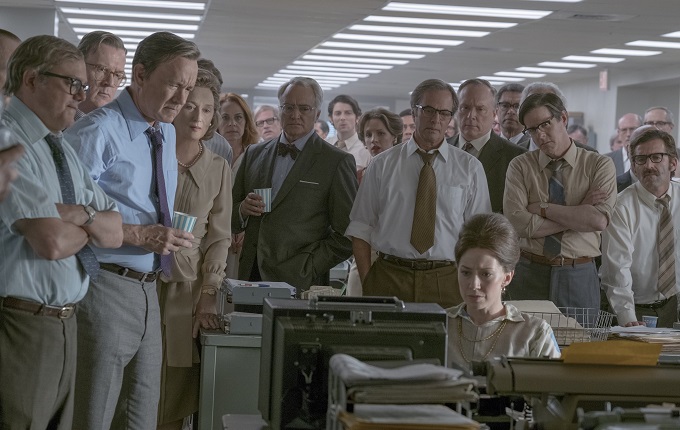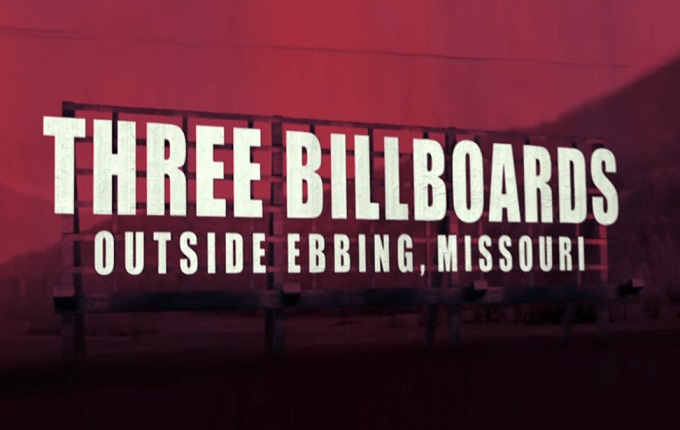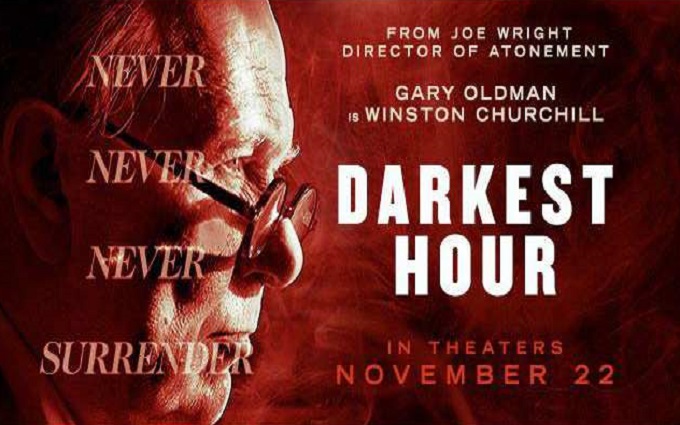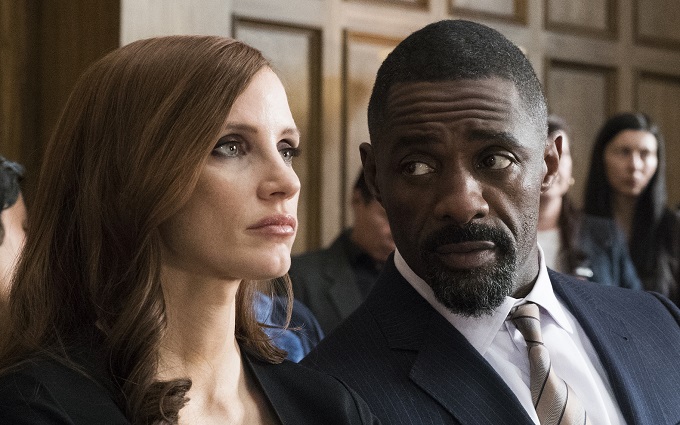The Post Review

The Plot
Based on the sensational true story The Post follows the legal battle between Nixon’s Whitehouse administration and The Washington Post over efforts to publish sensational revelations about the Vietnam War contained in classified government documents.
The Good
Director Steven Spielberg has a brilliant track record for documenting historical events in a dramatic and accessible way. His past work on Schindler’s List and Lincoln established his astonishing credentials in handling significant moments in global history with skill and due care. Spielberg brings his obvious passion to the cause of a free and fair press to the screen, having hastily made The Post seemingly as an act of urgent political necessity. That enthusiasm and sense of urgency does permeate the best moments of the film, bringing to life the thrill and perils of good journalism.
Meryl Streep and Tom Hanks both on predictably fine form, help inject some genuine personality into the real life news titans they portray. At this stage in their career their mere presence on screen is enough to make audiences realise that it’s important they pay attention. It’s almost as if they each emanate a constant Oscar winning glow, reassuring audiences of the unquestioned importance of proceedings.
Unsurprisingly given the Hollywood royalty behind the camera and in the two lead roles, the surrounding ensemble cast in The Post is littered with familiar faces and accomplished turns from brilliant character actors. The presence and nuanced sincerity of people like Bob Odenkirk and Bruce Greenwood helps lend added depth and sophistication to an otherwise simple story.
Though those familiar with the historical events the film documents may understandably find that the race against time dilemmas The Post explores are robbed of a little tension, thankfully fine performances hold audience’s attention in spite of this. Though the passage of time may have robbed these events of their modern reliance, the film does at least serve as an effective homage to an increasingly bygone era of exciting investigative journalism.
The Bad
While The Post does it’s best to capture the tension of a difficult dilemma of journalistic integrity, the importance of Vietnam War scandal may connect less with younger audiences for whom this chapter of American and world history feels increasingly remote. While some will be quick to try to draw direct parallels with modern political and media issues, in truth it’s difficult to connect these historic events with the dramatically evolved modern world.
Celebrating the golden era of investigative print journalism can’t entirely distract from the general collapse of the industry and the new more complex dilemmas arising from the new increasingly digital news landscape.
While The Post is well crafted it’s perhaps also difficult to avoid direct comparisons with other acclaimed films exploring similar themes such as All The President’s Men and more recently Spotlight. The Post perhaps doesn’t quite have as much emotional and political complexity as those films, though that’s amore a reflection on the facts of history than any particular filmmaking failure.
The Ugly Truth
Iconic director Steven Spielberg and the combined talents of an astonishing ensemble cast breathe life into a point in political, legal and media history that raises some of the same question and concerns that face a modern day audience. The Presence of stars Like Streep and Hanks lends the relatively straightforward events of the film the sense of gravitas and drama it requires.
Review by Russell Nelson
Coco Review

The Plot
During the day of the dead festivities a young boy with dreams of being a great musician finds himself accidentally crossing over from the land of the living to the world of the dead. While adapting to his strange and colourful new surroundings he finds himself torn between his own dreams and the stubborn objections of both his living and deceased family.
The Good
Coco has only just begun sweeping up best animation awards but already looks certain for forthcoming BAFTA and Oscar glory. These accolades are undeniably well deserved as Coco once again lives up to the astonishing reputation of Disney Pixar productions, effortlessly combining beautiful visuals with poignant emotional storytelling of the highest calibre.
Coco draws heavily on the wildly colourful and whimsical magic of the international renowned Day of the Dead celebrations. That constant explosion of colour and playful slapstick comedy helps allow the film to navigate potentially morbid and dauntingly sad themes in a way which is actually both uplifting and emotionally accessible. There’s something instantly comforting about the very particular view of the afterlife that Coco presents, suggesting that beyond this world is another one equally full of friends, family, music and love. The world of Coco is also beautifully realised through lush and detailed animation that gives Coco a distinctive visual style which is quintessentially Mexican and also universally appealing.
Coco also boasts a typically well-chosen Pixar voice cast with Gael Garcia Bernal doing particularly fine work as a seemingly hapless skeleton chancer who befriends the film’s young living hero and proves to be so much more than he initially appears. Likewise relative newcomer Anthony Gonzalez is convincingly plucky and petulant as young lead Miguel. In truth the entire voice cast breathe even more animated life into inventive character designs.
Music is another major theme in Coco, with the film’s entire narrative driven by the fierce tension between Miguel’s dreams of musical stardom and his family’s emphatically bitter rejection giving music any place in their lives. The music of Coco mirrors the overall tone of the film, succeeding in being obviously cheerful and fun, while gradually revealing more subtly bittersweet notes as the story progresses. In particular one of the film’s most beautifully memorable songs ‘Remember Me’ manages to evolve throughout the film, changing in tone and importance as new elements of meaning are revealed by the unfolding story.
Coco is a film which becomes more poignant and powerful as it progresses. In particular the final act of the film will almost certainly reduce grown up audiences to tears. Particular for those who have lost loved ones in their real lives, there is an emotional sincerity to later stages of the film which will almost certainly leave audiences with unashamedly tearstained cheeks. Any film which has the capacity to make audiences of almost any age laugh, cry and think in equal measure is deserving of praise and makes for truly essential viewing.
The Bad
During the film’s early stages while Coco sets up its central plot, our young hero’s extended family are at times so obnoxiously stubborn that they risk becoming irretrievably unlikeable. Though this is a necessary plot device used to set up an adventure which teaches everyone what ‘family’ truly means, it may still test audiences patience. Overall Coco is colourful and well-crafted but like many of Pixar’s films it deals with themes and emotional subtext that actually play more appropriately for audiences far older than the traditional target market for animated children’s films. Younger children’s attention may wander a little during portions of the film that deal with the poignant themes of mortality, love and loss. No matter how skilfully this content is handled it’s just simply not as appealing or accessible to small children as talking cars or singing snowmen.
The Ugly Truth
Coco is a breathtakingly heartfelt piece of animated magic that fills the screen with continuous colour and wonder. Pixar effortlessly rises to the challenge of tackling potentially difficult and sombre themes in a way that entertains young audiences and impacts grown-ups in equal measure. In particular Coco’s tear stained finale rivals the infamously poignant scene in Up as a contender for being the most beautiful and bittersweet moments Pixar has ever captured on screen. Coco is essential family viewing and a true masterpiece.
Review by Russell Nelson
Three Billboards Outside Ebbing, Missouri Review

The Plot
A mother personally challenges the local authorities to solve her daughter’s murder when they fail to catch the culprit.
The Good
It’s been nearly six years since writer/director Martin McDonagh last graced the silver screen with his second feature film, Seven Psychopaths. Given his obvious talents this absence already felt far too long. Thankfully McDonagh’s dark wit and genius storytelling is back with Three Billboards Outside Ebbing, Missouri, joining Psychopaths and In Bruges in his slow build of fine work.
In a role specifically written for her, Frances McDormand stars as Mildred, a grieving mother radicalised by grief and frustration. In an act of desperate defiance she rents out the titular three billboards running along a rarely used road in Ebbing in order to entice Woody Harrelson’s Chief Willoughby into solving the rape and murder of her daughter.
With a trio of brilliant central performances from McDormand, Harrelson and Sam Rockwell, Three Billboards doesn’t take long to reel you in and keep you on the edge of your seat as mysteries unfold while chuckling away at McDonagh’s script, peppered with dry wit throughout.
In addition, there are strong supporting cast performances most notably from Caleb Laudry Jones and Peter Dinklage who play Red Welby, the owner of the titular billboards and James, a Ebbing resident slightly besotted with McDormand’s Mildred. Undoubtedly though, the films powerhouse performance comes from its main star. McDormand brings a strong yet damaged character to life in a way only she can. While Harrelson and Rockwell are just as entertaining, it’s truly McDormand’s performance which will most likely stay with audiences the longest after the credits roll. It also looks increasingly likely to bring McDormand more well deserved Oscar glory.
The Bad
If you go into Three Billboards hoping to come out completely satisfied in terms of story threads being neatly tied, you may leave wanting more. For this critic the final moments especially are perfecty written with the feeling that these characters exist outside of the confines of the film’s 115 minute runtime however for some it may feel the complete opposite.
The Ugly Truth
As with McDonagh’s previous two offerings, Three Billboards brings characters and performances to the forefront. Those wanting more of a conclusion to the plot may leave feeling unsatisfied but it cannot be denied that McDonagh’s cast are nothing short of great company for the nearly two hour runtime.
Review by Johnny Ellis
Darkest Hour Review

The Plot
As Western Europe teeters on the brink of collapse at the start of World War 2 popular political outsider Winston Churchill becomes the new British prime minister. During Britain’s darkest days Churchill must not only find a way to win over a reluctant political establishment but more importantly avoid total military destruction and inevitable Nazi invasion.
The Good
Gary Oldman reconfirms his long held status as one of the most versatile and compelling character actors with a performance that outshines even his elaborate physical transformation. Thanks to some flawless makeup and prosthetics wizardry Oldman is physically unrecognisable, literally becoming the iconic British leader. However what’s most impressive is how even underneath copious layers of makeup and bodysuits Oldman is able to deliver a subtle portrayal that goes well beyond Churchill’s jowl shaking oratorical skills.
Around Oldman director Joe Wright has assembled a fine cast of character actors who breathe further life into the tense political landscape of Britain on the brink in 1940. Ben Mendelsohn deserves special note for his portrayal of King George VI, a daunting prospect in the wake of Colin Firths Oscar winning version.
Director Joe Wright manages to create a sense of momentum and carefully crafts the full weight of historic significance resting on Churchill and Britain’s shoulders during these most perilous moment sin world history. Much like recent crowd pleasers Dunkirk and Their Finest, Darkest Hour is innately imbued with a swell of pride that lingers still today from the immeasurable bravery and idealism demonstrated by a small island nation that stood utterly alone against evil.
The Bad
Anyone with even a most basic grasp of 20th century history already knows the ultimate outcome of the Second World War and Churchill’s personal destiny as one of the most iconic leaders in modern history. In particular Christopher Nolan’s recent blockbuster reminder of the miraculous Dunkirk evacuation is also still overly fresh in people’s minds. The inevitability of Churchill’s success and Britain’s military survival essentially robs the film of much of the dramatic suspense it seeks to create.
Winston Churchill is one of the most visual and vocally distinctive figures of the 20th century, consequentially he has been immortalised in film and television by countless actors already including most recent efforts by Brian Cox and The Crown’s John Lithgow. Unfortunately this leave Oldman with little room left for fresh discovery. At this point the highest compliment possible for the capable Oldman is that he manages to avoid slipping into flamboyant caricature.
In truth Churchill has been so frequently idolised and scrutinised by books, television and film that it is now simply impossible for this film to create any genuine sense of discovery or fresh insight. Oldman’s portrayal of Churchill is restrained and nuanced but always identifiably familiar. More critical or exaggerated versions of Churchill that have appeared on screen at least had the excitement of controversy or cartoonish fun to offer.
The Ugly Truth
Gary Oldman’s physically transformative performance and a splash of patriotic pride manages to make some overly familiar historic material feel once more compelling if not exactly original or surprising.
Molly’s Game Review

The Plot
The true story of Molly Bloom an Olympic class skier who launched a multi-million dollar empire running the world’s most exclusive high stakes poker games, only to become the target of an FBI investigation.
The Good
Aaron Sorkin has spent years garnering acclaim and respect as one of Hollywood’s most distinctive and compelling screenwriters. Finally making an effortless transition to directing as well, he bring his own well-polished script to life with considerable style and technical skill. He has clearly learnt well from the long list of talent directors who have lined up to work on his brilliantly fast paced and intelligent material.
In particular Sorkin has developed a reputation for dealing well with the unique challenge of transforming biopics of famous figures into entertaining big screen experiences. In the past the one criticism made of his well-crafted scripts for The Social network or Steve Jobs has been the liberal use of fiction in retelling supposed autobiographical material. With Molly’s Game Sorkin offer more of a conventional narrative, relying a little less on copious poetic licence. Molly Bloom’s reluctant attorney may be an invention of Sorkin’s imagination, but the core facts of her remarkable story remain true to life.
Sorkin always writes with a uniquely dense and rapid fire dialogue, thankfully leads Jessica Chastain and Idris Elba are fully capable of handling the demands of the script, delivering brisk and compelling results. Elba lends some gruff gravitas to Molly’s sceptical attorney, providing a useful narrative vehicle for audiences making their own discovery of Molly’s extraordinary journey. However the lion’s share of praise must deservedly go to lead actress Jessica Chastain, her emphatic narration and nuanced performance gives Molly Bloom far more dimension and depth than the easy stereotypes Hollywood could so easily have made her.
The Bad
While Molly’s Game starts with a relentless pace the film does lose some of that exciting momentum as it moves through a lengthy two hour twenty minutes run time. Even armed with Aaron Sorkin’s bristling dialogue it’s difficult to inject sufficient suspense to carry the story through its final third. In truth stories such as Molly Bloom’s do traditionally struggle during a final act where they must seemingly choose between whether to be cautionary tales or statements of defiant celebration.
Although Jessica Chastain and the rest of the supporting cast are all well-chosen fits they can’t entirely obscure the fact that beneath a heavy layer of glitz and glamour Molly’s story is often actually easily predictable and lacking in the kind of sensational twists that pure fiction so readily supplies.
The Ugly Truth
Molly’s Game is an accomplished directing debut for Aaron Sorkin and showcases a truly masterful performance from Jessica Chastain. The film delves into a lot of familiar Hollywood territory but does so armed with a smart script that mostly voids clichés and offers plenty of entertainment.
Review by Russell Nelson